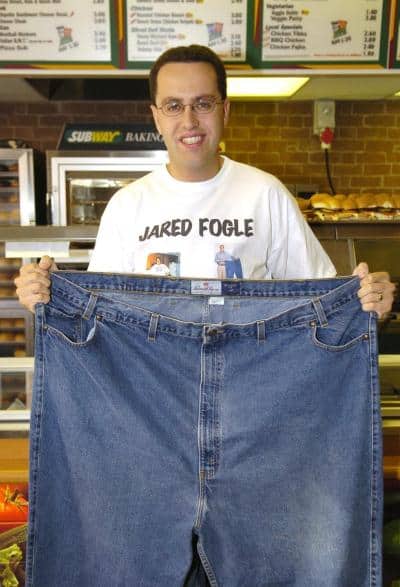
Measurements, Motivation, and Goals
Losing weight won’t make you a hero. It’ll trap you in a way. To keep it off or keep up the facade that because you’re thin everything’s great. If you’re assuming that reaching that body weight goal is going to magically make your life better, you’re in for a big disappointment. True, nobody will be able to call you fat anymore, and that sure seems like that’s worth just about any form of sacrifice, but the reality of the fact is that to do so you need to stop being you.
For better or worse, you have to get away from the way you think about and do things. You have to wean yourself from doing things you’ve become accustomed to. Life changes and we develop new habits. We learned shortcuts and accepted adaptations. We prioritized some and left others idle. By following our own systems, we ended up a lesser version of what we’d envisioned for ourselves.
Nobody plans to end up where they don’t want to be.
When our own devices fail us, we look outward for help and re-planning. They did it, so if I just do what they did I should achieve the same results. The trouble with this is, unless you have the same DNA, situation, and resources, you’re setting yourself up for failure. Change isn’t about overcoming circumstances — it’s the ability to work within them. Transformation occurs when you have the right plan at the right time within the right environment. All the ‘rights’ at the moment can be found by honestly assessing exactly where you are.
The best coaches (and therapists) ask you questions about yourself. They do this because they recognize that you have all the answers. We don’t seem to trust our own capacity to self-analyze, though. It’s as if we’re convinced that the same person who screwed things up can’t also fix things. The truth is, anything other than what you’re currently doing will lead you in the right direction. Whether you want to credit yourself or someone else for improvement, that’s up to you. But the triumph is yours. This is what we’re all after. Imagine how much more empowering the victory would be if the plan that achieved things came from you.
So how do we re-learn to trust ourselves? How do we shut out all the garbage that will be flung our way during resolution season and recognize we don’t need any of it?
Here are some suggestions to ignore the noise and dig into yourself:
1. Realize that investing in yourself doesn’t mean you have to put money out there.
Spending money on things (even information) tends to lead to disappointment. The vast majority of folks putting products into the world have most of their ideas available for free. Investing your time tends to pay back bigger dividends. Remember that someone who says, “Come with me” but charges for it isn’t really asking for your company. They demand your cover charge before entering the party. I’m not sure a seat at the cool kids table is worth it. Eating lunch with the school office secretaries might be the exact place you need to be.
2. Be patient. You didn’t get here overnight. Fixing is as much of a process as breaking.
I’m envious of the cute old ladies who sit on benches in the grocery store. They can just rest and remain with their hands folded in their laps and take in the world around them. They’re always quick to return a smile because their heads aren’t dropped, studying a phone. They catch everything, because they pay attention. We miss so much rushing to the end. What’s waiting for us there?
We applaud extremism because it’s fast. The results come quick. The flip side is that these results aren’t sustainable. This concept falls on deaf ears a lot of the time because we can’t think past the destination. Wanting things NOW without much thought or foresight is part of what got you here in the first place. Awareness is a practice in slowing down and assessing what’s happening. To calm down, notice things, and ask questions. When you hurry ahead, everything gets lost, especially the moment. If you’re in the middle of conquering something wouldn’t you want to savor it? You can’t trouble shoot without contemplating the process. Waiting until the end will leave you defeated, frustrated, and bewildered. You have to learn to make the proper adjustments. Treat it as fine tuning. Give yourself the time and practice to get it right.
3. Know that there are multiple ways to measure progress.
Numbers tend to dictate progress (or lack of), but unless you can separate yourself from the science, relying on numerical measurements might be part of the problem. For example, if you can’t look at extra fat or pounds as a result of taking in more calories than you burned, and instead view it as you being gross or incapable of sticking to a diet, perhaps this isn’t the metric you should be tracking. I know it sounds crazy in a data-driven, my-fitbit-will-tell-me-if-I’m-good modern world, but quantitative statistics often take us away from ourselves. Internal motivations turn external. Our experience gets reduced to a program on a page or a chart on a phone. We wreck the thing we valued and vowed to improve.
Case in point, getting that extra mile in gave you shin splints for a week. Progress shouldn’t be punishing. Current work shouldn’t incapacitate us for future work. What about monitoring pain, control, and mindfulness? How about how much you actually enjoy going out to do what you intend to do, and while you’re in it, wishing it would never end? These are the type of things that keep us engaged. They can be written down in journals just like food diaries or fitness logs. Putting your faith in feelings as much as you do numbers will get you closer to what ‘fitness’ is meant to entitle.
4. Recognize that most diet and exercise plans use “made up” rules.
There are very few laws in which we need to abide to lose weight. We already know them: take in less calories than you burn, and eat actual food — things that grow and rot. Everything else related to nutrition is theory. They are popularized accounts what worked for one and then large groups of people. These bandwagons then form camps that try to make you believe that their way is superior. But it’s not. It’s just a system that worked for them. Same thing with exercise. Folks will swear by their chosen hobbies: olympic lifting, yoga, crossfit, running, powerlifting, etc., but again, these fit these particular people at this particular point in their lives. You have every right and liberty to experiment and play around with things and formulate your own structure that works for you. (Who else but you can streamline an individualized plan for yourself?) The only way your way is the wrong way is if you’re not getting the results you seek. If you find yourself wanting, re-evaluate your measurements and/or your expectations and tinker accordingly.
5. You don’t have to finish something just because you started.
Whether it be food, relationships, or your burning desire to run a marathon, it’s OK to stop doing something. (I’ll use ‘stop’ because it’s far more accepted word than quitting, but it really is the same thing, and they’re both respectable decisions). Don’t want any more food in your bowl? Ditch it. Realize someone’s not worth the effort? Distance yourself from them. Acknowledge that 26 miles is a helluva long way and you’re actually not that interested? Do something else. Revising what you want is what life’s all about. Waning motivation is a sign of acknowledgement, not weakness. It’s you surveying the situation and determining you’re not pleased. Trust yourself in these situations. Your instincts are honed to make your life enjoyable. Use them.




